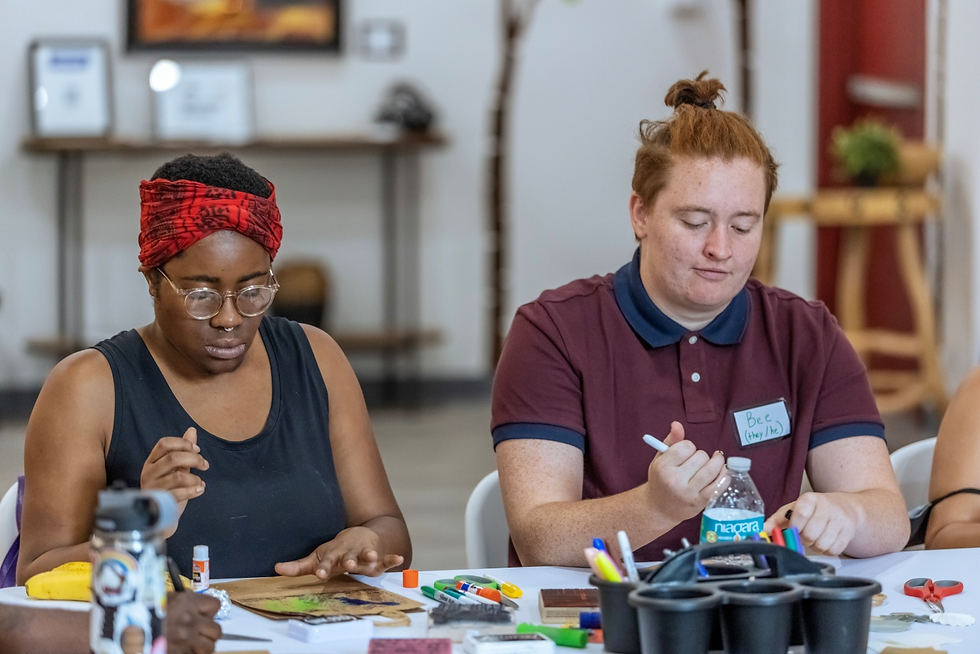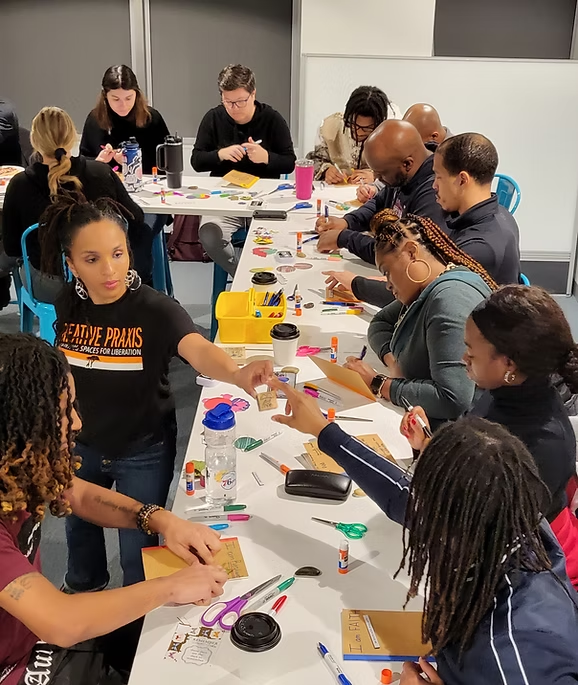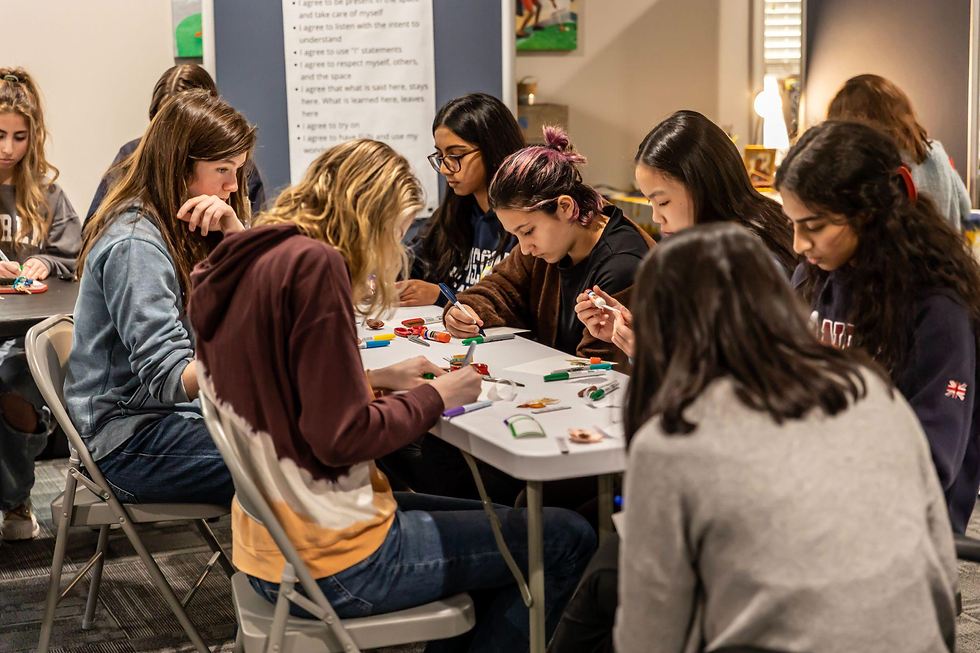Artful Change: How Arts-Based Training Transforms Youth Programs in Philadelphia
- Nia Eubanks-Dixon

- Jun 30, 2025
- 4 min read

Youth programs in Philadelphia are embracing arts-based training as a powerful way to strengthen staff, support young people, and build more connected communities. At Creative Praxis, an arts-based training organization, we offer professional development that mixes music, drama, and visual art into staff workshops.
Creative Praxis offers arts-based professional development programs in Philadelphia that create healing-centered, trauma-informed spaces for both adults and young people. Rather than relying on sit-and-listen lectures, our trainings use art-infused and interactive practices to spark creativity, foster connection, and support collective learning.
The Power of the Arts in Professional Development

Arts-based training bases its work on six humanistic practices, including art infusion, restorative practices, and trauma-informed education, to build community and empower attendees. Instead of passive lectures or slide presentations, staff are invited to paint, sing, or reflect through creative writing. By engaging different art modalities, trainees tap into nonverbal ways of expressing emotion and ideas.
These interactive facilitation methods keep participants engaged and improve learning outcomes. These highly creative, hands-on workshops boost engagement and retention. Participants leave with practical tools and renewed enthusiasm for their work.
Preventing Burnout and Healing Trauma
Youth workers and teachers often face high levels of stress, trauma, and even moral injury on the job. Secondary Traumatic Stress (STS) is common in this field. As students struggle, staff absorb tension and grief. Arts-based training directly builds resilience and self-care. A study found that using arts-based approaches to nurture creativity can help teachers build resilience to stress and discover new sources of joy and well-being. Arts-infused professional development significantly reduced teachers’ secondary traumatic stress while increasing their sense of joy and creative agency.
In practice, these sessions help staff slow down, reflect, and support one another. They use storytelling, music, writing, and other creative exercises for burnout prevention and secondary traumatic stress training for educators. In a safe, artful setting, staff can acknowledge vicarious trauma and practice compassion. By combining trauma-informed knowledge with creative expression, these trainings turn heavy topics into shared healing experiences.
We offer:
● Burnout Prevention for Educators – This dynamic session offers creative self-care practices rooted in art-making, movement, and reflection. Educators are invited to reconnect with their own joy and recharge in community, using expressive tools that restore energy and deepen self-awareness.
● Secondary Traumatic Stress Training – Through guided, arts-based processes, participants explore how secondary trauma shows up in the body and impacts their well-being. These sessions open space for storytelling, reflection, and healing—engaging the mind, body, and spirit to create pathways for rejuvenation, growth, and collective care.
● Vicarious Trauma Support for Professionals – In this communal experience, participants engage in collective art-making and dialogue to process the impact of vicarious trauma. Group exercises are designed to foster connection, encourage vulnerability, and cultivate shared practices of resilience, restoration and power.
These focused trainings equip teams with practical tools and a supportive community to both prevent and cope with stress. More than just helping educators stay energized, they build lasting skills that support well-being, sustain motivation, and reignite a sense of purpose in their work.
Building Safer, Restorative Environments

Arts-based training also translates into safer, more connected programs for young people. These integrate trauma-informed education strategies into every workshop, helping staff recognize trauma triggers and adapt with empathy. Drama, creative writing, and collaborative art projects teach restorative practice training concepts in action. For instance, teams might address common conflicts and then debrief with art to repair trust. These exercises turn abstract ideas (like forgiveness or accountability) into lived experience. Staff learn how to use art circles, music, or storytelling as restorative tools in their own classrooms or clubs.
The impact extends to youth participants as well. youth empowerment workshops in Philadelphia are a key part of Creative Praxis’s work. Young people are invited to co-create paintings, songs, or spoken-word performances about issues that matter to them.
Key training themes include:
● Restorative Practices Training – Facilitating arts-based dialogue and role-play to practice empathy and repairing harm.
● Trauma-Informed Education – Linking creative exercises with trauma-aware teaching strategies.
● Youth Empowerment Workshops – Engaging young people in creative projects that build confidence and leadership.
● Interactive Facilitation – Hands-on, experiential sessions (music, drama, and art) that keep participants actively learning.
These approaches help organizations evolve. After arts-based PD, staff collaborate better and youth feel heard. By grounding education in the arts and healing, programs create environments where students and staff are safer, more creative, and more engaged.
Impact and Evidence
Creative Praxis’s impact is backed by participant feedback. Thousands of participants (over 3,000 per year) have experienced these trainings. Nearly all report learning new skills and understanding the material deeply. In a 2022 study, participants credited the arts-based training for developing important soft skills. These included empathy, communication, creativity, and self-awareness, which are often missing in traditional training formats. In practice, organizations that partner with Creative Praxis often note improved staff morale and retention.
The evidence is clear: when staff feel supported and creative, organizations grow stronger. Arts-based training promotes wellness, builds community, and ultimately leads to better outcomes for youth. Philadelphia youth programs using Creative Praxis report seeing more engaged staff and more positive atmospheres. Educators don’t just learn concepts; they experience them through art, making the change stick.
How Creative Praxis Can Help

At Creative Praxis, we believe that art isn’t just for students; it can transform entire organizations. By blending creativity with trauma-informed education and restorative practices, our arts-based professional development programs in Philadelphia keep staff energized and protect them from burnout and secondary trauma.
These arts-based trainings create safer, more supportive learning environments where young people thrive. Artful change leads to real change: stronger teams, healthier programs, and communities united in creativity.
Contact us today to bring our transformative training program to your school, nonprofit, or youth-serving organization!





Comments